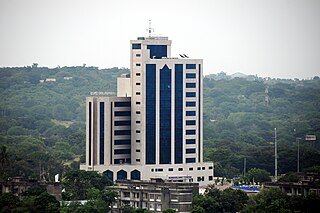
Communications in Gibraltar comprise a wide range of telephony systems, Internet access, broadcasting and satellite control. There is also printed and online media. Regulation of telecommunications and broadcasting are the responsibility of the Gibraltar Regulatory Authority (GRA), established by means of the Gibraltar Regulatory Authority Act in 2000.

Communications in Somalia encompasses the communications services and capacity of Somalia. Telecommunications, internet, radio, print, television and postal services in the nation are largely concentrated in the private sector. Several of the telecom firms have begun expanding their activities abroad. The federal government operates two official radio and television networks, which exist alongside a number of private and foreign stations. Print media in the country is also progressively giving way to news radio stations and online portals, as internet connectivity and access increases. In 2012, a National Communications Act was also approved by Cabinet members, and 2 October 2017, the president of Somalia Finally signed the National Communications Law, and became the official Law that regulated the ICT industry. Under that Law, National Communications Authority (NCA) of the federal Republic of Somalia has been established, with board of directors and a general manager. Somalia currently is ranked first in Africa for most affordable mobile data per gigabyte and 7th in the world.
Telecommunications in the United Kingdom have evolved from the early days of the telegraph to modern broadband and mobile phone networks with Internet services.

The Regulation of Investigatory Powers Act 2000 is an Act of the Parliament of the United Kingdom, regulating the powers of public bodies to carry out surveillance and investigation, and covering the interception of communications. It was introduced by the Tony Blair Labour government ostensibly to take account of technological change such as the growth of the Internet and strong encryption.
Telecommunications in Albania include radio, television, fixed and mobile telephones, and the Internet.
Types of communications in Algeria, including telephones, mass media and the Internet.

The Office of Communications, commonly known as Ofcom, is the government-approved regulatory and competition authority for the broadcasting, telecommunications and postal industries of the United Kingdom.

The Independent Communications Authority of South Africa (ICASA) is an independent regulatory body of the South African government, established in 2000 by the ICASA Act to regulate both the telecommunications and broadcasting sectors in the public interest.
Telecommunications in Montenegro includes radio, television, fixed and mobile telephones, and the Internet.
Pakistan Post is a state enterprise which functions as Pakistan's primary and largest postal operator. 49,502 employees through a vehicle fleet of 5,000 operate traditional "to the door" service from more than 13,419 post offices across the country, servicing over 50 million people. Pakistan Post operates under the autonomous "Postal Services Management Board" to deliver a full range of delivery, logistics and fulfillment services to customers.

Vodafone Albania SH.A is a major telecommunications company based in Tirana, Albania. It is part of the Vodafone Group.
ALBtelecom Mobile, formerly known as Eagle Mobile, was a mobile communication company that operates in Albania. Back in March 2008, it was first founded as a subsidiary of ALBtelecom, which had been privatized in October 2007, with a majority of shares sold by the Albanian government to a consortium of two Turkish companies; Calik Holding and Türk Telekom. Calik possesses 80% of the company and Türk Telekom the remaining 20%.
ALBtelecom sh.a. was an Albanian telecommunications company. It was established as Albania's state company that provided telecommunications services through a fixed network. On 5 December 1912 the Provisional Government led by Ismail Qemali established the Ministry of Post Telegraph Telephones, where ALBtelecom existed only as a government office. It is the largest fixed line telephone company in the country, currently covering with Optical Fiber Backbone Network the entire territory of Albanian cities.
The Indian Telecommunication Service, widely known as ITS, and earlier known as Telegraph Engineering Service Class I is one of the Central Civil Services under Group 'A' of the executive branch of the Government of India. The appointment to this service is done through Combined Engineering Services Exam held every year by Union Public Service Commission (UPSC) of India. The service was created to meet the techno managerial needs of the government in areas related to telecommunications. The Department of Telecommunications (DoT) had been managed for years by the officers of this permanent cadre, called the Indian Telecommunications Service (ITS). The officers of ITS work under restrictions and rules of Central Civil Services (Conduct) rules.
The Autorité de Régulation des Communications Électroniques, des Postes et de la Distribution de la Presse is the French regulatory authority in charge of regulating telecommunications, postal services and print media distribution in France. It can be compared somewhat with the United States' Federal Communications Commission (FCC), though regulation of the radio spectrum falls to the Agence nationale des fréquences, and regulation of audiovisual and digital communication falls to the Autorité de régulation de la communication audiovisuelle et numérique since the merger on 1 January 2022 of the former Conseil supérieur de l'audiovisuel and the former Haute Autorité pour la diffusion des œuvres et la protection des droits sur internet. The ARCEP has its head office in 14 rue Gerty Archimède in Bercy, Paris, France.

The Body of European Regulators for Electronic Communications (BEREC) is the body in which the regulators of the telecommunications markets in the European Union work together. Other participants include representatives of the European Commission, as well as telecommunication regulators from the member states of the EEA and of states that are in the process of joining the EU.

The Tanzania Communications Regulatory Authority (TCRA), established by the TCRA Act No. 12 of 2003, is an independent Authority for the postal, broadcasting and electronic communications industries in the United Republic of Tanzania based in Mikocheni ward of Kinondoni District of Dar es Salaam Region. It merged the former Tanzania Communications Commission and the Tanzania Broadcasting Commission. The TCRA is accountable to the Communications and Technology Ministry. The Information Communication and Technology (ICT) sector reform in Tanzania is notable in that development was influenced by regional, political (national) and technological factors. Tanzania is one of the few African countries to liberalise the communications sector whereby the Converged Licensing Framework (CLF) is used as a key strategy, in terms of the Tanzania Communications Regulations. Since inception in 2003, the TCRA has issued a number of regulations to administer the sector, but still faces a number of challenges such as the roll-out of services to under-serviced rural areas.

PLUS ALBANIA Communication SH.A. was an Albanian telecommunications company. It was the 4th mobile operator in Albania by number of subscribers.

One Albania sh.a is a telecommunications company that operates in Albania. It was founded as Albanian Mobile Communications and was part of the COSMOTE Group since 2000. In 2015, the company joined the Deutsche Telekom group after which it was rebranded as Telekom Albania.










